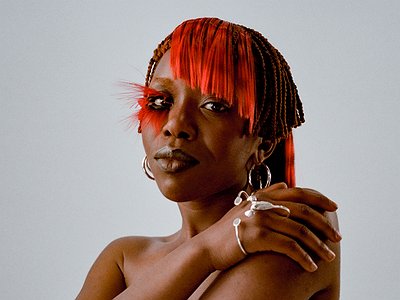Name: Martha Canga Antonio aka Martha Da'ro
Nationality: Belgian-Angolan
Occupation: Multidisciplinary artist, actor, vocalist, songwriter
Current release: Martha Da'ro's new album Philophobia is out via Aniratak.
Recommendations: Diana Vreeland: The Eye Has to Travel (documentary); Grace Jones: I’ll Never Write My Memoirs (book)
If you enjoyed this Martha Da'ro interview and would like to keep up to date with her music, visit her on Instagram, Soundcloud, and Facebook.
When I listen to music, I see shapes, objects and colours. What happens in your body when you're listening? Do you listen with your eyes open or closed?
When I listen to music that “touches,” I listen with my eyes open.
I love to be inspired enough to see things and there is no better feeling than seeing things when your eyes are open.
Entering new worlds and escapism through music have always exerted a powerful pull on me. What do you think you are drawn to most when it comes to listening to and creating music?
When it triggers my imagination.
According to scientific studies, we make our deepest and most incisive musical experiences between the ages of 13-16. What did music mean to you at that age and what’s changed since then?
Some sort of freedom and empowerment. I remember being in my room at 14, dancing and singing along to Bob Marley. I loved the way that with such simplicity these strong messages were shared.
I feel like now it still feels that way. Feeling seen and heard in music now also gives me the feeling of freedom and empowerment.
How would you describe your relationship with your instrument, tools or equipment?
My main instrument is my voice. I’d say I have a good relationship with it.
I’m not afraid / ashamed when it doesn’t sound perfect, as long as the emotion or story is expressed in the most genuine way possible.
Where does the impulse to create something come from for you? What role do often-quoted sources of inspiration like dreams, other forms of art, personal relationships, politics etc play?
The biggest source of inspiration is life. Might sound cliché, but whatever I’m not able to express in life I try to express in my music.
Are you acting out parts of your personality in your music that you couldn't or wouldn't in your daily life? If so, which are these? What, would you say, are the key ideas behind your approach to music?
When making a song, I first write down whatever needs to get out. And afterwards, I try to find the music / sounds that tell the same thing as what I wrote.
If music is a language, what can we communicate with it? How do you deal with misunderstandings?
Music is a universal language, which makes it easier to be “understood”. And even if you’re not understood by everyone at least you’re heard.
Making music, in the beginning, is often playful and about discovery. How do you retain a sense of playfulness and how do you still draw surprises from tools, approaches and musical forms you may be very familiar with?
It goes a little bit with the previous question. As in, I try to make sure what I make keeps exciting me.
I try to challenge myself and not get in a comfort zone in which I just create things I know will “work”. And for that, letting go of the fear of being misunderstood is important - I think.
Sound, song, and rhythm are all around us, from animal noises to the waves of the ocean. What, if any, are some of the most moving experiences you've had with these non-human-made sounds? How far would you describe them as “musical”?
I feel like there is nothing more beautiful than the sound of the rain on concrete. It’s not only musical but magical. :)
There seems to be an increasing trend to capture music in algorithms, and data. But already at the time of Plato, arithmetic, geometry, and music were considered closely connected. How do you see that connection yourself? What aspects of music do you feel can be captured through numbers, and which can not?
What I like about (making) music is the fact that even though almost every aspect can be captured in numbers and data, there is this indescribable thing about it, that can heal people, make them cry, feel nostalgic, euphoric, seen …
How does the way you make music reflect the way you live your life? Can we learn lessons about life by understanding music on a deeper level?
Just like in music, being authentic in life always pays off.
We can surround ourselves with sound every second of the day. The great pianist Glenn Gould even considered this the ultimate delight. How do you see that yourself and what importance does silence hold?
Because of the way my brain works, I often need my moment to just be by myself in silence.
Just being able to only listen to my own breath is very important for me.
Do you feel as though writing or performing a piece of music is inherently different from something like making a great cup of coffee? What do you express through music that you couldn't or wouldn't in more 'mundane' tasks?
I don't think it’s much different than making a great cup of coffee. If you put care and passion into it, and you practise, it only gets “better”. At least it gets closer to what good or great means to you.
If you could make a wish for the future – what are developments in music you would like to see and hear?
Much fairer remuneration for artists from streaming platforms




